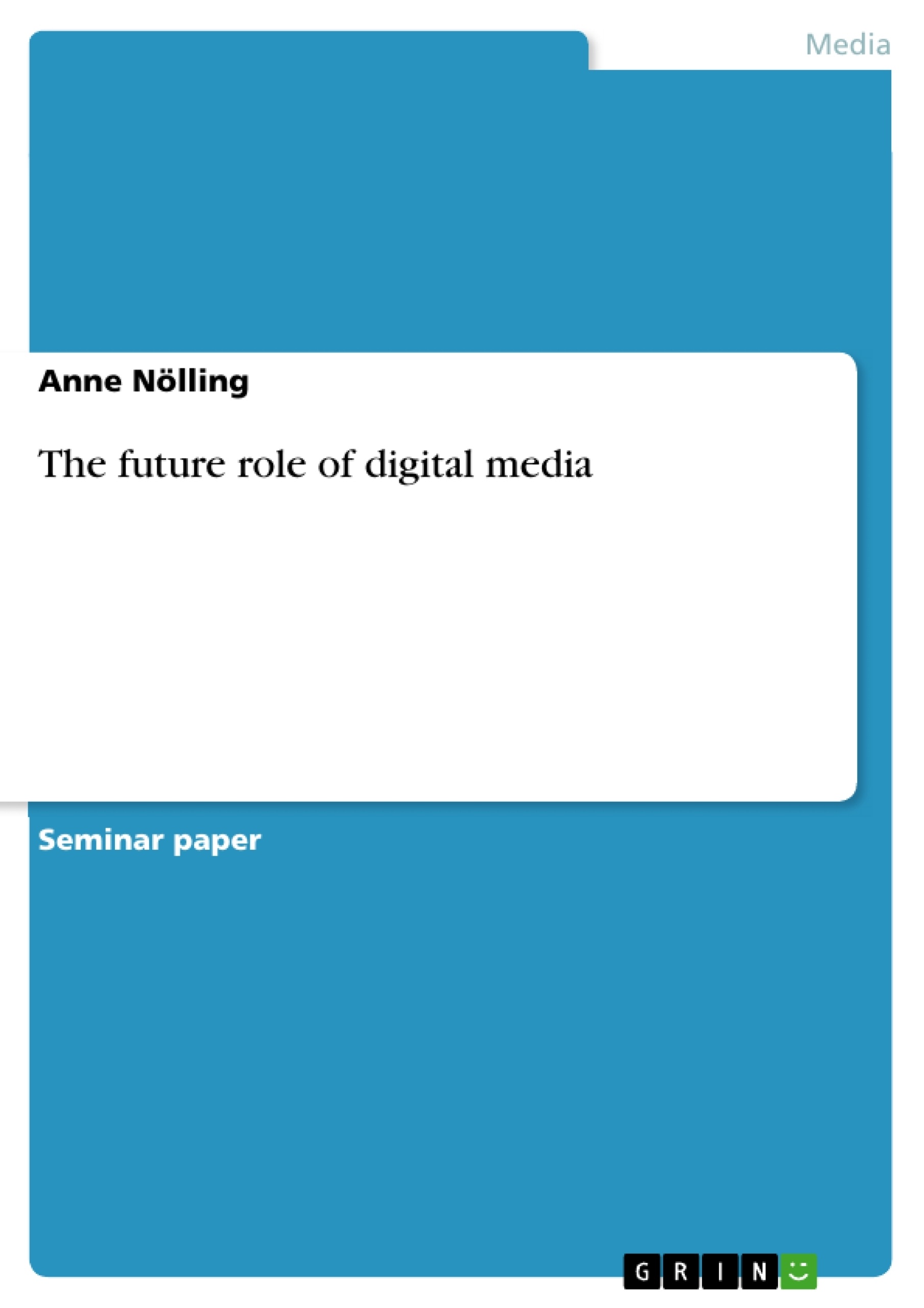The previous chapters of the book „Managing Media Companies: harnessing creative Value“ by Annet Aris and Jaques Bughin will show, that the digitization of media “(…) will fundamentally influence the way ´traditional´ media are managed”. The chapter summed up in this work will describe digital media and its influences. The future role of digital media: After a short introduction acout the history of digital media or „New Media“ and the reasons for the genesis of the internet-bubble and its explosion, this assignment will show the development of “New Media” after the explosion. Then a short overview about the beginning of broadband-technology and promising business models is subject of this work. After that I will provide two case-studies to show the practical relevance of the chapter. 2.1 A brief history of the digital media bubble The new media experienced its first hype in the 1990s. The dial-up internet, a key innovation, made it possible to change the internet to a mass medium. Many existing media companies but also a lot of start-ups discerned the possibilities of this key innovation. Low entry barriers, high expectations and faith into the advertising market made it possible that within only a few years a big new industry came into being. This was mostly financed by venture capital. And actually the internet was received so well as a new medium, that there were 600 milion users by the year 2002. A situation of excess supply developed in the new media market. In trust of a further rise investors invested more and more in stocks and shares of this companies. Within one and a half year, beginning in the middle of 1999, this brought a multiplication of rates to a few companies, and therefore an uncontrolled overvaluation of the rates appeared. This effect was intensified by a lot of companies and their mostly blind urge of expansion. The liquidity received by IPOs was invested into further purchases of companies but without any regard to their balances - they quite often were in the red. [...]
Table of Contents
- Introduction
- The future role of digital media
- A brief history of the digital media bubble
- Current digital media models
- IP-TV/digital-TV
- Combined ISPs/portals
- Content players struggling to make content pay
- Search engines highly attractive
- The future is broadband
- Broadband Uptake
- New Business Models
- Rebalancing the broadband value chain
- Case Study: Arcor Online - Video in demand
- Arcors's history
- Arcors's business segments
- Arcor's business model
- Arcor-Online
- Arcor Video on Demand
- Recommendation for action - Arcor Video in Demand
- Case Study: genios – paid content
- genios's history
- genios´s business segments
- genios's business model
- Recommendation for action
- General Learnings
- Do's
- Don't's
Objectives and Key Themes
This assignment aims to analyze the evolution of digital media, particularly after the burst of the internet bubble. It explores the development of new media models and the rise of broadband technology, highlighting successful business strategies. The assignment focuses on the practical application of these concepts through two case studies, showcasing the potential of digital media in the real world.
- The evolution of digital media from its early hype to the emergence of new business models.
- The role of broadband technology in shaping the future of digital media.
- The challenges and opportunities of content monetization in the digital landscape.
- The impact of search engines and their role in the digital media ecosystem.
- Successful business models for digital media companies, emphasizing the importance of strategic planning and understanding consumer behavior.
Chapter Summaries
The assignment begins with a brief history of the digital media bubble, exploring its origins, rapid growth, and eventual collapse. It then delves into current digital media models, showcasing the diverse approaches employed by media companies. The assignment highlights the increasing importance of broadband technology and its impact on content delivery, business models, and user experience. The chapter culminates in two case studies, Arcor Online and genios, showcasing the practical application of the concepts discussed throughout the assignment.
Keywords
The key themes and concepts explored in this assignment include the digital media bubble, new media models, broadband technology, content monetization, search engine optimization, business model innovation, and case studies like Arcor Online and genios. The assignment emphasizes the evolving landscape of digital media and the importance of strategic thinking in navigating this dynamic environment.
Frequently Asked Questions
What caused the digital media bubble of the 1990s?
The bubble was caused by low entry barriers, high expectations for the advertising market, and massive venture capital investment into startups, leading to uncontrolled overvaluation.
How did broadband technology change digital media?
Broadband enabled high-speed delivery of rich content, allowing for new business models like Video on Demand (VoD) and more sophisticated interactive portals.
What are the challenges for digital content players?
Content players often struggle to make paid content profitable, as users are accustomed to free information, requiring innovative monetization strategies like "genios".
Why are search engines considered highly attractive?
Search engines act as gateways to the internet, providing immense value through targeted advertising and controlling the flow of information to users.
What can we learn from the Arcor Video on Demand case study?
The case study explores how telecommunications companies can leverage their infrastructure to offer value-added services and the strategic decisions needed to succeed in the VoD market.
What are the general "Do's and Don'ts" for media companies?
Success in digital media requires balancing creative value with sound financial management, avoiding blind expansion, and focusing on sustainable business models.
- Citar trabajo
- Anne Nölling (Autor), 2006, The future role of digital media, Múnich, GRIN Verlag, https://www.grin.com/document/59102



